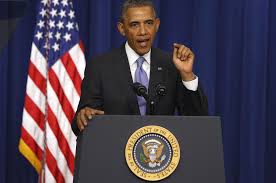
It's his obligation, Obama said, to re-examine intelligence capabilities because of the potential for trampling on civil liberties. "I believe critics are right to point out that without proper safeguards, this type of program could be used to yield more information about our private lives and open the door to more intrusive, bulk collection programs." This affects hundreds of millions of Americans.
Obama also called for a stop to spying on "friendly" international leaders. This practice came to light in documents leaked by Whistleblower Edward Snowden. It caused international anger, especially from German Chancellor Angela Merkel and Brazilian President Dilma Rousseff. Obama said, "The leaders of our close friends and allies deserve to know that if I want to learn what they think about an issue, I will pick up the phone and call them rather than turning to surveillance."
Changes to the NSA spying program come on the heels of Snowden's leaks about secret surveillance programs. While the President’s proposals would lead to changes in the NSA's bulk collection of phone records, authorized under Section 215 of the USA Patriot Act, many question where the data will be moved. Obama gave the intelligence community and the attorney general 60 days to study options.
About the speech, Julian Assange of Wikileaks told CNN, "It's embarrassing for a head of state to go on like that for 45 minutes and say almost nothing." The Executive Director of Amnesty International, Steven Hawkins, warned, "Obama's surveillance adjustments will be remembered as music on the Titanic unless his administration adopts deeper reforms."
Michael Kohn, president of The National Whistleblower Center said the changes under consideration are nothing more than short-term widow dressing. "Congress and the President must do their jobs, and stop destroying the lives of civil servants who try to report misconduct. A free and open society deserves nothing less.”